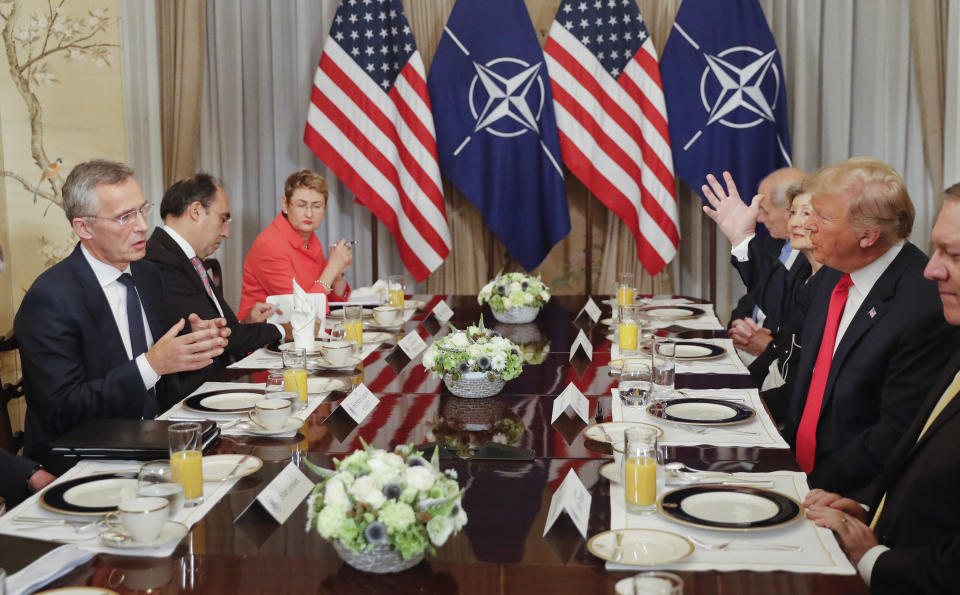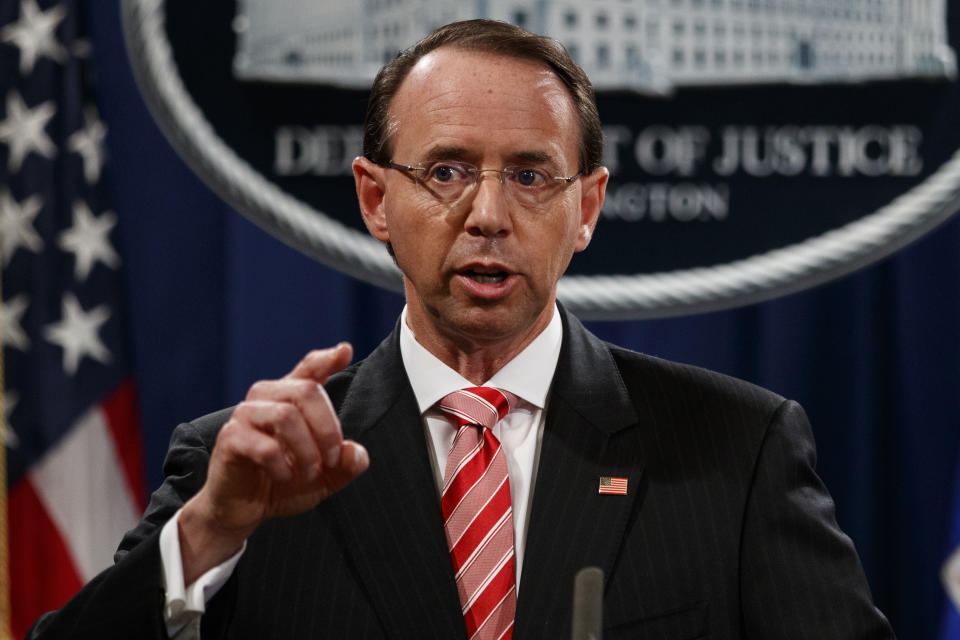Trump whiplash: From Supreme Court euphoria to foreign turbulence

A work week that began with a triumphant unveiling of President Trump’s latest nominee to the U.S. Supreme Court ended with the indictment of 12 Russian intelligence officers, a move that undercut the president’s claim that Robert Mueller’s investigation amounted to a “witch hunt.”
In between those major news developments, the week proved especially turbulent, even by Trump-era standards, as the president headed to Europe. Here’s a recap:
July 9
Trump’s demeanor Monday in the East Room of the White House was of a man taking a victory lap. He kicked off his announcement that he was nominating federal appellate court Judge Brett Kavanaugh as Justice Anthony Kennedy’s replacement by touting the gravity of the decision.
“I’ve often heard that, other than matters of war and peace, this is the most important decision a president will make,” Trump said. “The Supreme Court is entrusted with the safeguarding of the crown jewel of our republic, the Constitution of the United States.”

Trump, who routinely reminds conservative audiences of his pick of Neil Gorsuch to the high court, knows that stacking the court with right-leaning justices is what most matters to many of his supporters. The White House said Monday that the president expects Kavanaugh to be quickly confirmed, and given the makeup of the Senate, there’s little reason to doubt that assertion.
July 10
Still riding high on the Supreme Court announcement, Trump turned his attention to his European trip. The first order of business was a stop in Brussels for a meeting with NATO allies, who Trump put on notice with a Tuesday tweet barrage that centered on his belief that NATO’s payment structure is unfair to the United States.
Getting ready to leave for Europe. First meeting – NATO. The U.S. is spending many times more than any other country in order to protect them. Not fair to the U.S. taxpayer. On top of that we lose $151 Billion on Trade with the European Union. Charge us big Tariffs (& Barriers)!
— Donald J. Trump (@realDonaldTrump) July 10, 2018
NATO countries must pay MORE, the United States must pay LESS. Very Unfair!
— Donald J. Trump (@realDonaldTrump) July 10, 2018
Many countries in NATO, which we are expected to defend, are not only short of their current commitment of 2% (which is low), but are also delinquent for many years in payments that have not been made. Will they reimburse the U.S.?
— Donald J. Trump (@realDonaldTrump) July 10, 2018
The European Union makes it impossible for our farmers and workers and companies to do business in Europe (U.S. has a $151 Billion trade deficit), and then they want us to happily defend them through NATO, and nicely pay for it. Just doesn’t work!
— Donald J. Trump (@realDonaldTrump) July 10, 2018
July 11
Upon his arrival in Brussels, Trump continued his attacks on NATO, much to the dismay of U.S. allies, especially Germany.
“Germany, as far as I’m concerned, is captive to Russia because it’s getting so much of its energy from Russia,” Trump told NATO Secretary General Jens Stoltenberg in an exchange captured live. “We have to talk about the billions and billions of dollars that’s being paid to the country we’re supposed to be protecting you against,” Trump added.

The broadside was widely decried, including by former U.S. Secretary of State John Kerry.
“I’ve never seen a president say anything as strange or counterproductive as President Trump’s harangue against NATO and Germany,” Kerry said in a scathing statement. “It was disgraceful, destructive and flies in the face of actual American interests.”
July 12
After trashing NATO member states on the first day of the two-day meeting, he reportedly threatened to pull the U.S. out of the organization and demanded that the allies agree to pay 4 percent of their GDP to support it.
But Trump abruptly softened his tone on Thursday.
The president declared the meetings he had attended in Brussels to be “very unified, very strong, no problem,” despite numerous accounts to the contrary. Trump also declared victory on the subject of raising the percentage of GDP that each NATO nation would pay, saying they had agreed to increase current levels “very substantially.”
Great success today at NATO! Billions of additional dollars paid by members since my election. Great spirit!
— Donald J. Trump (@realDonaldTrump) July 12, 2018
The problem with that proclamation is that there did not seem to be an actual agreement. In a news conference after Trump had made his claims, French President Emmanuel Macron told reporters that member states were sticking to prior commitments to spend half of the percentage demanded by the U.S. president.
“There is a communiqué that was published yesterday. It’s very detailed,” Macron said, according to France 24. “It confirms the goal of 2 percent by 2024. That’s all.”
But back in America, Trump was getting something he wanted. For six hours, Republicans on House Judiciary Committee and the House Oversight and Government Reform Committee grilled FBI deputy assistant director Peter Strzok over texts sent to former FBI lawyer Lisa Page. Strzok, a lead agent in the investigations into Hillary Clinton’s email server and the special counsel’s probe of the Trump campaign’s ties to Russia, had written critically of Trump in his texts with Page, and the president and Republicans on the committee saw it as clear evidence of bias that clouded both inquiries. Democrats, meanwhile, noted that many members of the GOP had expressed similar skepticism about Trump during the 2016 election.

As Trump arrived in England and was greeted by massive protests, he granted an interview with the Sun, a tabloid owned by Rupert Murdoch. The paper released its story, in which Trump bashed British Prime Minister Theresa May for attempting to mitigate Brexit consequences and cast doubt on future trade deals between the U.S. and the U.K., just as Trump was making his first photo-op with the British leader.
July 13
The Sun’s interview with Trump dominated global headlines and the president went into damage control mode, accusing the newspaper for misrepresenting what he had told them about the British Prime Minister.
“I said tremendous things, and fortunately we tend to record stories now so we have it for your enjoyment if you’d like it,” Trump said at an awkward joint news conference with May. “We record when we deal with reporters. It’s called ‘fake news,’ and we solve a lot of problems with the good old recording instrument.”

In the same news conference, Trump said that immigration had been a “very negative thing for Europe.”
“Europe is a place I know very well,” he said, “and I think that what has happened is very tough. It’s a very tough situation. I mean, you see the same terror attacks that I do. You see them a lot.”
The White House has not responded to Yahoo News’ multiple requests to obtain audio of the interview, other than to provide a statement saying the president “likes and respects Prime Minister May very much.”
Moments after Trump and the first lady met with Queen Elizabeth at Windsor Castle, another bombshell dropped in the special counsel’s investigation into ties between the Trump campaign and the Russian government during the 2016 presidential election. Deputy Attorney General Rod Rosenstein announced that 12 Russian intelligence officials were indicted in connection with the hack of the Democratic National Committee’s computer server.

The indictments, which come just two days ahead of a planned summit between Trump and Russian President Vladimir Putin in Helsinki, undercut Trump’s frequent assertions that there was no proof that Russia had been behind the DNC hack.
“There is no allegation in this indictment that Americans knew that they were corresponding with Russians,” the White House said in a statement Friday.
Trump lawyer Rudy Giuliani echoed that defense in his own statement.
The indictments Rod Rosenstein announced are good news for all Americans. The Russians are nailed. No Americans are involved. Time for Mueller to end this pursuit of the President and say President Trump is completely innocent.
— Mayor Rudy Giuliani (@RudyGiuliani) July 13, 2018
Of course, not everyone in Washington agreed with Giuliani’s assessment.
In light of today’s indictments, there should be no one-on-one meeting between President Trump and Vladimir Putin on Monday. There must be Americans in the room. If the President won’t make Russia’s attack on our election the #1 issue at the summit, then it should be canceled.
— Mark Warner (@MarkWarner) July 13, 2018
_____
Read more from Yahoo News:



